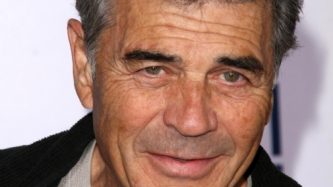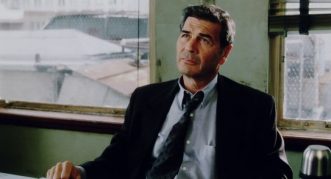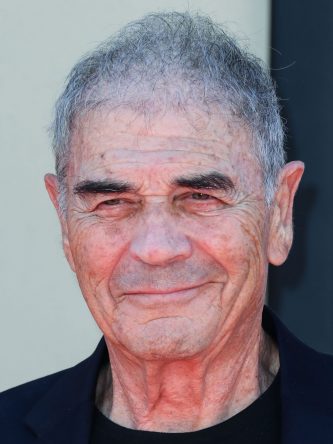 2019 is shaping up as, among other things, a year in which quite a few vital character actors breathed their last. Dick Miller, Rutger Hauer and Sid Haig all left us in 2019, and joining their ranks on October 11 was the great Robert Forster. I won’t get into which of those actors I liked the best, but will reveal my contention that of the four Mr. Forster was the most chameleon-like and difficult to pin down.
2019 is shaping up as, among other things, a year in which quite a few vital character actors breathed their last. Dick Miller, Rutger Hauer and Sid Haig all left us in 2019, and joining their ranks on October 11 was the great Robert Forster. I won’t get into which of those actors I liked the best, but will reveal my contention that of the four Mr. Forster was the most chameleon-like and difficult to pin down.
He remains best known, it seems, for the steely tough guy roles he essayed in his final decades, initiated by Quentin Tarantino’s JACKIE BROWN, in which Forester played Max Cherry the hard-boiled bail bondsman. Yet he’s best known in some quarters for the fact that he often showed his penis onscreen, and also for the cunning psychopath he played in AMERICAN PERFEKT (1997) and his turn as an Iranian terrorist in THE DELTA FORCE (1986). The man, in short, had range.
But again, Robert Forster made his living as a character actor, for which range isn’t necessarily a good thing. The most durable supporting players tend to be cast based on certain recognizable traits and characteristics; there was a definite “Dick Miller role” just as there were Rutger Hauer and Sid Haig roles, whereas Robert Forster wasn’t really known for any one thing.
This would seem to partially explain the decades-long career slide Forester experienced after gaining positive attention  for his work in late 1960s prestige fare like REFLECTONS IN A GOLDEN EYE and MEDIUM COOL. I doubt any actor has ever experienced quite as dramatic a career slowdown as Forster did, with his roles in big studio movies giving way in the 1970s and 80s to the decidedly less prestigious (though arguably more fun) likes of ALLIGATOR and VIGILANTE (which, together with his appearances in THE DARKER SIDE OF TERROR and THE BLACK HOLE, assured him a permanent place in the genre movie hall of fame).
for his work in late 1960s prestige fare like REFLECTONS IN A GOLDEN EYE and MEDIUM COOL. I doubt any actor has ever experienced quite as dramatic a career slowdown as Forster did, with his roles in big studio movies giving way in the 1970s and 80s to the decidedly less prestigious (though arguably more fun) likes of ALLIGATOR and VIGILANTE (which, together with his appearances in THE DARKER SIDE OF TERROR and THE BLACK HOLE, assured him a permanent place in the genre movie hall of fame).
The early-to-mid 90s saw his fortunes descend even further, into straight to video sequels and no-budget features (such as POINT OF SEDUCTION: BODY CHEMISTRY III and SCANNER COP II). By the time JACKIE BROWN came around in 1997 Forster’s career was, in his own words, “dead. No agent, no manager, no lawyer, no nothing.” It was Tarantino, through that film, who single-handedly resurrected Forster’s career, about which he was admirably upfront: “I’m not sure how a guy wins or loses in this business, but somebody’s got to come along and make you lucky. You can’t do it yourself.” Still, I say the perseverance and sheer skill demonstrated by Mr. Forster had something to do with his late period career resurgence, winning him the respect of not merely Tarantino but also David Lynch, Larry Cohen and AMERICAN PERFEKT’S Paul Chart.
Speaking of Quentin Tarantino, he once stated something to the effect of how a truly good actor truly proves his/her mettle by excelling not in prestige movies but in grade B fare. That would seem to explain why he was so enamored with Robert Forster, who always bought his “A” game whether he was employed by John Huston, David Lynch or Cannon’s Menahem Golan. This, keep in mind, is from one who as a kid first became aware of Forster through his roles in THE BLACK HOLE and ALLIGATOR; I didn’t get around to seeing MEDIUM COOL or REFLECTIONS IN A GOLDEN EYE until much later in life, and didn’t notice any noticable difference in his work between the first two films and the second.
Especially memorable Forster roles include that of an emissary for the angel of death in the 1991 indie fantasy IN BETWEEN (proof that not all his pre-JACKIE BROWN 1990s films were without worth); Sherriff Frank Truman in TWIN PEAKS: THE RETURN, in which he replaced Michael Ontkean and brought a sense of strength and intelligence that contrasted nicely with the series’ uber-weirdness; Detective McNight in Lynch’s MULHOLLAND DRIVE, in which Forster conversely fit in quite w ell with the overall Lynch aesthetic; and a voice-only turn in the 2018 short film NASTY, enhanced by Forster’s inimitable East Coast accented intonations (I’ll refrain from discussing his work in outrages like the REAR WINDOW and PSYCHO remakes, and also the Tin Allen sitcom LAST MAN STANDING, all of which occurred after Forster’s career downturn yet are arguably more insulting than the many awful movies he appeared in during that dark period).
ell with the overall Lynch aesthetic; and a voice-only turn in the 2018 short film NASTY, enhanced by Forster’s inimitable East Coast accented intonations (I’ll refrain from discussing his work in outrages like the REAR WINDOW and PSYCHO remakes, and also the Tin Allen sitcom LAST MAN STANDING, all of which occurred after Forster’s career downturn yet are arguably more insulting than the many awful movies he appeared in during that dark period).
Beyond all that Robert Forster was widely known for his gentlemanly demeanor, as has been testified by everyone from Pam Grier to David Lynch. As for myself, I view the man as, simply, someone who over the years I really came to enjoy seeing onscreen. With Forster I learned to quite literally expect the unexpected. The fact that we won’t be seeing him anymore is a sad one, as in the movie-verse a small but quite blazing light has now dimmed for good.
